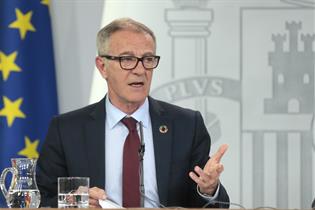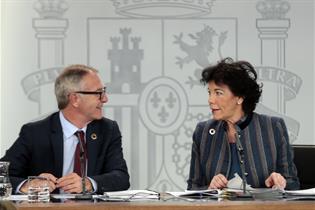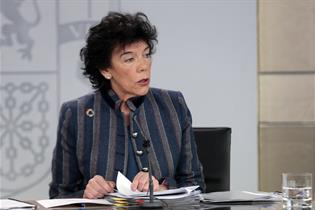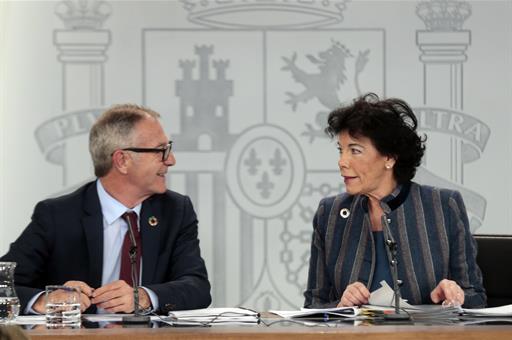Moncloa Palace, Madrid
The Council of Ministers studied the Draft Sports Bill presented by the Minister for Culture and Sport. José Guirao stated that this law is one of the government's priorities, because the present law dates back to 1990 and over these last 29 years, sport has changed and "now plays a much more central and important role in Spanish society".
José Guirao underlined that "millions of Spaniards practise sport at different levels on a daily basis". "This is a fundamental sector for the economy, and provides stable work for close on 240,000 people", "receiving some 2.5 billion euros per annum" from the different tiers of government, he explained.
The Draft Bill recognises sport as a right for the first time and promotes real and effective equality because "equality has been a hallmark of this government since day one", claimed José Guirao. Hence, women's sport, which is not included in this present law, will be regulated for the first time.
In line with the Equality Act, a minimum percentage of 40% of women is established on the management bodies of sports entities. Along this line, high-level athletes will have this status extended by four years "to thus protect their right to maternity", said the minister. Sports federations will set up a gender committee, and furthermore, all grants and sports prizes awarded with backing from the public authorities, but which presently have different amounts assigned for men and women, will be put on an equal footing, which will bring an end to what José Guirao described as "incomprehensible discrimination".
The consideration of inclusive sport and the programmes promoting this as general interest is another of the new features. "Sports activity for those people with some form of disability is a very valuable tool for their inclusion in all social dimensions", remarked the minister.
 Pool Moncloa/JM CuadradoA new and more detailed classification of athletes will allow a distinction to be made between those practising sport on an occasional basis and those participating in competitions. Similarly, a new type of professionalised competition will be created with amateurs and professionals alongside each other so as to "facilitate their rise from one category to another, since at present this abyss is huge", explained José Guirao.
Pool Moncloa/JM CuadradoA new and more detailed classification of athletes will allow a distinction to be made between those practising sport on an occasional basis and those participating in competitions. Similarly, a new type of professionalised competition will be created with amateurs and professionals alongside each other so as to "facilitate their rise from one category to another, since at present this abyss is huge", explained José Guirao.
Sports entities may continue to operate as clubs or become public limited or limited liability companies. In turn, sports federations must draw up their own code of good governance and transparency and set a limited mandate for officers of their management bodies and create an independent economic oversight committee. This latter measure will also apply to professional leagues.
The minister pointed out that the text will be published on the web pages of the Ministry of Culture and Sport and of the National Sports Council so that interested parties can make contributions.
Spain has a safe transport system
The Council of Ministers presented a report on Transport and Infrastructure Safety, which concluded that Spain has a safe transport system, although it could be improved in certain areas.
The Minister for Education and Vocational Training and Government Spokesperson, Isabel Celaá, explained that a diagnosis has been made of the strengths, vulnerabilities and areas for improvement in such key aspects as highways, railways, ports, maritime rescue, airports and air traffic control infrastructures. The three technical accident investigation committees in place were also analysed: the Civil Aviation Accident and Incident Investigation Committee, the Railway Accident Investigation Committee and the Maritime Accident and Incident Investigation Standing Committee.
As a result of this study, the government has designed an action plan with eight strategic pillars and more than 60 initiatives with the aim of strengthening investments in safety, supervision, control, cyber security and operational management in the case of emergencies, among other aspects.
Among these measures, Isabel Celaá highlighted those aimed at increasing railway safety, and the creation of a single independent administrative authority for the technical investigation of accidents.
Commitment to Vocational Training (VT)
 Pool Moncloa/JM CuadradoThe government agreed that the Innovation Centre for Vocational Training of Aragon, with headquarters in Zaragoza, should be incorporated into the network of National Benchmark Centres, within the area of commercial logistics and the group of professional transport management in terms of trade and marketing related to VT.
Pool Moncloa/JM CuadradoThe government agreed that the Innovation Centre for Vocational Training of Aragon, with headquarters in Zaragoza, should be incorporated into the network of National Benchmark Centres, within the area of commercial logistics and the group of professional transport management in terms of trade and marketing related to VT.
The National Benchmark Centres are public centres characterised by their programming and implementation of actions of an innovative, experimental and formative nature in terms of VT.
On another note, in the list of healthcare personnel, the government has changed the name of the qualification of "Specialised Higher Technician" to "Higher Technician". Isabel Celaá pointed out that this will thus be standardised with statutory personnel and hence foster their mobility between different health centres.
Appointment of European prosecutors
The government regulated the procedure to appoint candidates as European Prosecutors and European Delegated Prosecutors in Spain.
The Government Spokesperson clarified that a European Prosecutor is a new figure established in European treaties whose aim is to combat crime that prejudices the financial interests of the European Union, cross-border fraud, corruption and money laundering. This new body is scheduled to come into operation in November 2020.
Each Member State must appoint three candidates to cover the position that corresponds to it in the College of the European Public Prosecutor's Office and select at least another two for the positions of European Delegated Prosecutors to be established in each Member State.
Isabel Celaá announced that in Spain a committee made up of representatives of the Ministries of Justice, and of Foreign Affairs, the European Union and Cooperation, and of the Spanish Public Prosecutor's Office and of the General Council of the Judiciary will perform the selection.
The candidates "may be judges or prosecutors, must offer absolute independence and extensive experience in financial investigations and international legal cooperation", specified the Government Spokesperson.
Acquisition and loss of military status
The Council of Ministers amended the Regulation on the Acquisition and Loss of Military Status and Administrative Situations of professional servicemen, to facilitate the reincorporation of servicemen into civilian life.
In the case of army and navy personnel, the minimum notice period to apply for a leave of absence is reduced from three months to a fortnight. The minimum leave of absence is reduced from six months to three and their post is reserved for a period of four months should that serviceman on leave of absence wish to return to service.
In the case of pilots, they must have completed a minimum of 12 years of service in the Spanish Air Force before applying for a leave of absence.
European Social Charter
The government agreed to submit the revised European Social Charter to Parliament and declared Spain's consent to be subject to said Charter.
This means, according to Isabel Celaá, that the list of protected economic and social rights is extended and amendments are introduced, paying close attention to the most vulnerable.
Archipelago of Cabrera
The Council of Ministers agreed to extend the limits of the National Land-Sea Park of the Archipelago of Cabrera, incorporating adjoining maritime areas. Hence, the surface area of the park will increase from e current 10,021 hectares to 90,800.
The Government Spokesperson highlighted that, by extending the area, the Archipelago of Cabrera will become the largest national marine park in the Western Mediterranean and the largest national park in Spain. "We have 8,000 kilometres of coastline and 1 million square kilometres of seas that make us the richest country in marine bio-diversity in the European Union".
Free and democratic elections in Venezuela with due guarantees
 Pool Moncloa/JM CuadradoDuring her habitual weekly assessment, Isabel Celaá declared that the visit by the President of the Government, Pedro Sánchez, to the Dominican Republic and Mexico are framed within his "clear and defined" policy to extend relations between Spain and Latin America.
Pool Moncloa/JM CuadradoDuring her habitual weekly assessment, Isabel Celaá declared that the visit by the President of the Government, Pedro Sánchez, to the Dominican Republic and Mexico are framed within his "clear and defined" policy to extend relations between Spain and Latin America.
The Government Spokesperson stated that the President of the Government has addressed the political, economic and social crisis unfolding in Venezuela with both the Dominican and Mexican leaders. On this point, she recalled that Spain's position is firm: the recognition of Juan Guaidó so that free democratic elections can be held with internationally verified guarantees.
"The Government of Spain has headed up this position, which is a common European position that has manifested itself as the position adopted by many countries in recent days, as notified by the High Representative of the European Union in a communiqué, and by a vote in favour in the European Parliament on Thursday", underlined Isabel Celaá.
The government, stressed Isabel Celaá, is closely monitoring the situation of the 167,000 Spanish residents in Venezuela and, in particular, the attention being received by the press. "We need them to be our eyes and ears there, in the streets of Caracas, in the barracks, in the government and in the opposition. We cannot allow ourselves to be blindfolded".
The Government Spokesperson also underlined that foreign policy is a State affair and called for unity of democrats in the search for liberty and democracy for Venezuela.
Non official translation





